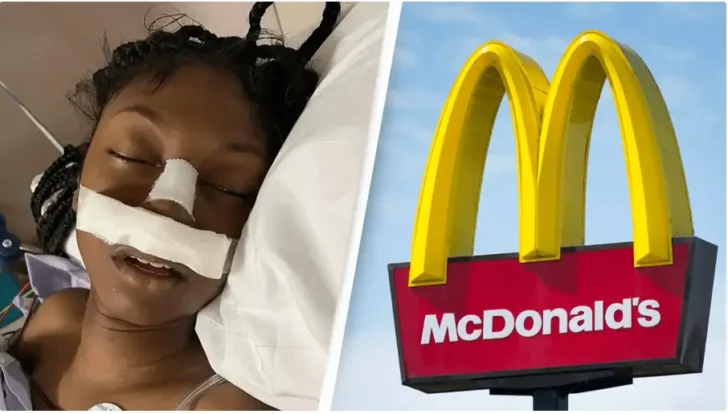In our daily lives, we often seek solace in familiar and communal spaces like our beloved fast-food restaurants. However, these sanctuaries can quickly transform into unexpected scenes of violence, as demonstrated by the harrowing experience of Aryiah Lynch, a 15-year-old McDonald’s employee in St. Louis, Missouri. Her brutal attack serves as a stark reminder of the invisible dangers that lurk in our environments and the imperative need for dialogue on safety and holistic well-being.
As we delve into the troubling incident that befell Aryiah, it is crucial to acknowledge the profound physical, emotional, and spiritual repercussions that follow such acts of violence. This article aims to illuminate the details of the assault, the aftermath for Aryiah’s life, and the broader implications it carries for the realms of safety and overall well-being.
The Incident Unveiled: Unraveling the Assault
On the tranquil day of April 8, a sense of peace was shattered in a McDonald’s parking lot in St. Louis, Missouri. What transpired next was a ruthless attack on 15-year-old Aryiah Lynch by a 25-year-old patron named Johnny Ricks. What began as a mere disturbance at the drive-thru spiraled into a vicious physical altercation that inflicted severe harm upon Aryiah.
The unfolding of the assault was swift and brutal. Johnny Ricks, after causing a scene at the drive-thru window, escalated his aggression upon entering the restaurant. In a fit of rage, he vandalized property and assaulted the staff, dragging Aryiah by her hair, unleashing multiple punches, and ultimately stomping on her head. Tragically, these actions resulted in a fractured skull and grave damage to her frontal lobe.
The Lingering Impact: Aryiah Lynch’s Injuries and Recovery Journey
The ramifications of the attack on Aryiah Lynch reverberated not only due to its cruelty but also due to the grave injuries she incurred. A day that commenced like any other ended with a life-altering ordeal for Aryiah, underscoring the frailty of health and well-being in tumultuous situations.
Aryiah’s Injuries:
– Fractured Skull: The brutal stomping led to a critical skull fracture, necessitating urgent medical intervention.
– Broken Nose: In addition to her skull injury, Aryiah suffered a broken nose from the physical assaults.
– Frontal Lobe Damage: Of utmost concern was the damage inflicted upon her frontal lobe, a vital brain region for cognitive and emotional functions.
Medical Response:
Following surgery on April 17, Aryiah’s medical team successfully addressed her complex fractures and brain injuries. She received comprehensive care at a local hospital in Saint Louis, focusing on managing her physical wounds and guiding her initial phase of recuperation.
Post-surgery, Aryiah has been confined to bed rest, prioritizing stress minimization and allowing her body the necessary time for proper healing. The arduous road of recovery lies ahead for Aryiah, with her medical team and community playing pivotal roles in supporting her healing process.
Community and Legal Responses: Pursuing Justice and Safety
The violent assault on Aryiah Lynch catalyzed a profound outpouring of community outrage and rapid legal action. As news of the incident rippled through social media and local networks, both the public and law enforcement were galvanized into action, highlighting the steadfast commitment to justice and safety.
Johnny Ricks was swiftly apprehended post-assault, facing a slew of charges encompassing felony assault and property damage. His arrest symbolizes the concerted efforts of the legal system to address violent behaviors and shield individuals from harm.
The management of the local McDonald’s branch, helmed by owner Jimmy Williams, actively collaborated with St. Louis County police, aiding in unraveling the incident and ensuring a thorough investigation.
In a show of unwavering solidarity, the community rallied around Aryiah Lynch by establishing a GoFundMe campaign to defray her medical expenses and provide support during her recovery. This initiative not only alleviates financial strains but also underscores the robust support system within the community.
The attack also ignited a broader conversation on social media and within local circles regarding the necessity for heightened security measures in public domains to preempt such calamities in the future.
Emotional and Psychological Fallout: Navigating Post-Traumatic Challenges
The repercussions of violent incidents like the assault on Aryiah Lynch extend beyond physical wounds, delving into the realm of profound emotional and psychological scars. Understanding and addressing these facets are pivotal for comprehensive healing and renewal.
Understanding the Impact:
– Victims of violence may grapple with acute stress or even develop post-traumatic stress disorder (PTSD), manifesting as nightmares, intense anxiety, and intrusive thoughts of the assault.
– The specter of reliving the trauma may disrupt daily routines, rendering victims apprehensive of resuming normalcy or revisiting places tied to the harrowing experience.
– Individuals may feel isolated and detached post-assault, struggling to articulate their feelings and experiences to others.
Strategies for Emotional Recovery:
– Seek Professional Assistance: Engaging with therapists or counselors specializing in trauma offers victims a safe haven for processing emotions and experiences.
– Leverage Community Support Networks: Drawing on the strength of community groups can diminish feelings of isolation and foster empathy among individuals with shared experiences.
– Embrace Mindfulness and Meditation: Practicing mindfulness and meditation can ameliorate anxiety and enhance mental clarity in coping with distress.
Fostering a Supportive Environment:
– Educate on Emotional Well-Being: Cultivating awareness within the community about the emotional repercussions of violence engenders empathy and support for victims.
– Cultivate Resilience: Initiatives concentrating on fortifying emotional resilience equip individuals with coping mechanisms for stress and psychological setbacks.
Community Resilience and Support Systems
While incidents like the assault on Aryiah Lynch may shake communities to their core, they also unveil the resilience and unity embedded within communal ties. In the aftermath, communities unite to proffer support, advocate for reform, and nurture healing for those impacted. Here’s an in-depth exploration of how community resilience and support systems play a pivotal role in traversing and recovering from traumatic events:
Mobilizing Support Networks:
During crises, community members converge to provide emotional, practical, and financial aid to those directly affected. Crowdfunding campaigns, community fundraisers, and meal arrangements alleviate the immediate burdens confronting victims and their families.
Informal support networks, encompassing friends and neighbors, furnish ongoing assistance and camaraderie throughout the recovery process.
Advocating for Change:
Incidents of public violence precipitate far-reaching dialogues on safety measures and the imperative need for systemic amendments. Community members advocate for policy reforms, heightened security protocols, and improved support services for victims.
Grassroots activism enables community leaders and advocates to collaborate with local entities, businesses, and organizations to institute tangible reforms fostering prevention and safeguarding environments.
Nurturing Resilience Through Connection:
Beyond reactionary responses to crises, nurturing a sense of belonging and interconnectedness within communities bolsters resilience and solidifies bonds among residents. Collective activities like neighborhood gatherings, volunteer initiatives, and support groups create forums for communal bonding, shared experiences, and mutual assistance.
By harnessing the prevailing solidarity, fervor for advocacy, and sense of connection, we foster safer, more nurturing environments where individuals feel empowered, supported, and valued.
Tips for Enhancing Safety: Personal and Community Strategies
In the aftermath of the attack on Aryiah Lynch, cognizance of practical measures to bolster safety is paramount. Consider these stratagems for fortifying personal and community well-being:
Personal Safety Tips:
– Maintain Vigilance: Stay attuned to your surroundings ceaselessly to recognize potential threats and evade perilous circumstances. Vigilance is key to preempting hazardous situations, whether in solitude, crowded spaces, or familiar locales.
– Acquire Basic Self-Defense Skills: While unexpected, familiarity with rudimentary self-defense techniques engenders empowerment and assurance in exigent situations. Enroll in a self-defense class or workshop to glean practical skills for protecting oneself.
– Instate Workplace Safety Protocols: Employers should instate crystal-clear safety protocols integrating emergency responses and conflict de-escalation tactics, ensuring employees are equipped to navigate crises.
Community Safety Enhancements:
– Community Watch Programs: Vigilant community watch programs foster collective security and attentiveness within neighborhoods. These programs empower community members to surveil local activities, report suspicious behavior, and collaborate with law enforcement to address potential threats.
Concluding Remarks
The unforeseen violent assault on Aryiah Lynch serves as a poignant reminder of the invisible risks pervading our daily environments and the urgent need for conversations on safety and well-being. As communities grapple with the aftermath of such traumas, the fortitude, unity, and resilience displayed in times of crisis serve as beacons of hope and catalysts for positive change. By fostering supportive environments, advocating for reform, and nurturing communal bonds, we pave the way for safer, more compassionate societies where individuals can heal, thrive, and flourish.






